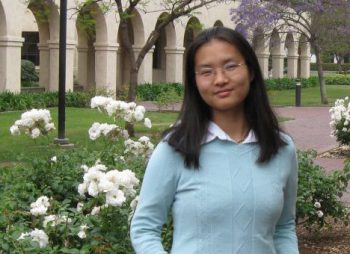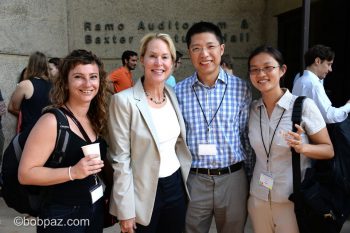
As a female scientist studying tuberculosis (TB) in the Center for Global Infectious Disease Research at Seattle Children’s Research Institute, Dr. Shuyi Ma was ecstatic to learn that her undergraduate mentor became the fifth woman in history to receive the Nobel Prize in Chemistry. She shares her reaction to the news and how her mentor helped shaped her career with On the Pulse.
When I first heard the news that Dr. Frances Arnold had won the 2018 Nobel Prize, I cried aloud in delight as I jumped up and down in my kitchen. Frances was my academic and research advisor when I was an undergraduate student at the California Institute of Technology (Caltech), so waking up to the news of this global recognition was one of the most exhilarating mornings I’ve ever had.
I started working with Frances as a sophomore. It was amazing to me that her lab was able to apply engineering to biology, so I had asked her if I could learn how she did this. Although I had never worked in an experimental lab before, Frances took a chance on me, giving me the opportunity to gain hands-on experience with her craft, and it in turn crafted me into the scientist I am today. I still hold close the many lessons she imparted on me, using them to guide my scientific career.
Life lesson #1: Let nature be your guide
The first thing I learned from Frances is that proteins—far more than what makes up your chicken dinner— are specially encoded chains of molecules that fold themselves into tiny intricate machines. The shape, movement, and function of each protein could be tuned by changing the molecule links that make up the chains.
Frances had figured out that the way to design these links for optimal protein function was to let nature be her guide. She taught me that I could engineer the functionality of a protein by making a large library of daughter copies, each harboring random differences in their encoded chain, and then testing these daughter proteins to find the one with the most desired function. This best daughter protein then served as the template for the next round of modification and selection. I learned that drastically improved functionality can arise through this “directed evolution” cycle – the discovery for which Frances won the Nobel Prize.
Frances showed me that letting nature show you what changes were important to a system could lead to important biological insights. I find myself applying this important lesson in my current work. As a TB researcher, I use a strategy that enables me to prevent the TB-causing bacteria from producing each of its proteins, and I test the effect of this on the bacteria’s survival and response to drugs. In this way, I am letting nature guide me to the proteins that may be most important for designing anti-TB drugs. This strategy is also broadly applicable to other kinds of infectious diseases.
Life lesson #2: Science is hard, but having a supportive lab helps

Being part of Frances’s lab felt like being part of her extended family. Frances understood that doing science is psychologically demanding, so she did whatever she could to support us in our work. Although she supervised more than 20 scientists, her door was always open to me whenever I needed to talk. She tempered the stress of presenting progress during lab meetings with small gestures like always providing lunch for the group.
Doing science can frequently feel like an incredibly isolating endeavor because the goal can seem perpetually out of reach, the path toward it can fill with failures and false starts, and sometimes no one else can help as no one else knows the “correct answer.” To counter this isolation, Frances encouraged an open and collaborative environment among everyone who worked with her.
Often, I would hear an outburst of laughter from my lab mates in an adjoining lab space, sometimes over the TV show “Doctor Who,” which we were all watching, or sometimes with the excitement of a new experimental result. Outside of work, Frances would invite us all to her home for annual parties, where we would watch movies while eating popcorn and petting her cats.
Life lesson #3: Foster life-long friendships and partnerships
Even after I graduated from Caltech, Frances still has made me feel like a part of her lab family. Every December, she emails all of her former lab members and asks for news and updates during the past year. She then assembles a newsletter that she sends out to her entire alumni network, enabling us to keep connected not only with her, but also with each other.
I remain close with several of those lab partners from Caltech, both personally and professionally. I regularly swap cat photos, “Doctor Who” opinions, and edits of manuscripts that we plan to submit to scientific journals with the scientist who first taught me how to use a pipette.
Under Frances’s mentorship, I took my first steps in becoming a scientist. I was inspired by her exquisitely elegant strategy and by her incredible tenacity. Her life-long friendship and partnership have provided support as I pursued my Ph.D. in chemical engineering and continued my graduate studies, leading me to my current research developing new drugs to treat TB. It has been such a privilege to learn from her example, and I am proud that she has been recognized with the highest scientific honor for her work.
Resources
- Center for Infectious Disease Research Joins Seattle Children’s Research Institute
- Shuyi Ma’s Cool Job Fighting TB in Seattle

